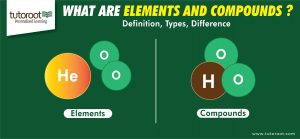What are Elements and Compounds? Definition, Types, Difference

One of the most common questions, students who are learning chemistry will ask themselves is? How are Element and Compounds different from each other? And it is very important for these students to learn the differences between them, and to have a good understanding of them. Therefore, to help these people out, we have put together a detailed guide on Elements and Compounds, their differences, Types, and many more here in the below section.
What is an Element?
Elements are officially described as chemical substances that have the same number of atoms, especially protons present in the nuclei while the electrons might be different in number. Moreover, Elements are complete chemical substances, and they are represented on the Periodic Table. Currently, there are 118 elements, including 24 synthetic elements and 94 naturally occurring elements.
Besides, there are multiple characteristics of elements. Firstly, the elements consist of only one kind of atom. Secondly, as said above, the elements are represented in the periodic table using IUPAC numbers. Third, the elements cannot be divided or broken into separate, essentially smaller fragments.
Types of Elements
Now that you have understood what elements are? Let us now talk about the different types of elements. First of all, the elements are generally differentiated into two types, metallic and non-metallic elements based on their properties and group. In addition to this, the metallic element groups are further divided into multiple types such as f-block elements, Main Group Metals, Transition metals, etc.
What is a Compound?
Moving onto the next topic, A compound is defined as the chemical combination of two or more elements, which occurs when they are combined in a fixed ratio by mass. This is why generally compounds comprise two or more elements. However, due to this process, sometimes, new properties are gained by compounds, while the individual elemental properties are gone.
Types of Compounds
Similar to the elements, Compounds are usually categorized into two types, first salts, and molecular compounds. For instance, in salts, two or more elements are bound together with the help of ionic bonds, while in molecular compounds, atoms are all bound together with covalent bonds.
Difference Between Elements and Compounds
There are many differences between Elements and Compounds, which we are going to discuss briefly here in the below section.
| Parameter | Elements | Compounds |
| Definition | Pure Chemical Substances consist of only one type of atom. | When two or more elements are combined chemically in fixed proportions, then the formed component is referred to as a Compound. |
| Types | Elements are categorized into metals and non-metals. | While the compounds are categorized into ionic and molecular, based on their bonds. |
| Representation | Elements are generally represented through numbers and symbols. | Whereas the compounds are represented by their chemical formula. |
| Breakdown | They cannot be broken down with the help of chemical reactions. | However, compounds can be broken down into separate elements. |
| Composition | Elements are made up of similar types of atoms. | While similar types of molecules are used to make up a compound. |
| Examples | Iron, Copper Gold, etc. | NaCl and NaOH. |
Conclusion
In the article above, we have explained all about chemical compounds, and elements, their differences, compound examples, as well as types of compounds and elements. If you are having a tough time studying any other topics in Chemistry subject, then it would be a good idea for you to join the online interactive classes offered by the Tutoroot platform, and access all its benefits.
If you’re looking for similar kinds of simplified explanations like the one provided above, explore the chemistry blogs on the Tutoroot website. For a deeper understanding and personalised guidance in your studies, take advantage of Tutoroot’s chemistry online tuition. Start your journey with us by scheduling a FREE DEMO session today and experience the benefits of one on one online tuition.
FAQ
Is salt a compound or an element?
Salt is categorized as an ionic compound, which is made of Cl- and Na+ ions.
What is the most electronegative element?
Currently, Fluorine is the most electronegative element in the periodic table.
